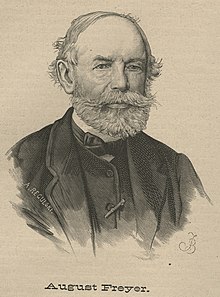Karl August Freyer
Karl August Freyer (in Poland : Karol August , also only: August , born December 15, 1801 in Oberschaar , † May 28, 1883 in Góra Kalwaria ) was a German-Polish organist and composer of church music in the 19th century.
Life
Karl August Freyer was the son of the landowner Johann Gottfried Freyer and his wife Johanna Dorothea geb. Brook. Even as a child he showed great musical talent and had been taking music lessons from the Annaberg cantor KB Geißler since he was 6 years old. At the age of 10 he moved to Leipzig , where he took lessons in music theory and composition from the famous organist Friedrich Schneider . This recommended him further training with the Warsaw master Joseph Xaver Elsner and Freyer went to Poland in 1827, where he was to stay until the end of his life.
During the first three years of his stay in the Polish capital, Freyer studied music theory at the Warsaw Music Academy and devoted himself to teaching. Among other things, he was the first teacher of the then eight-year-old Stanisław Moniuszko and a close friend of Frédéric Chopin , who gave him his portrait with a heartfelt dedication.
In 1834 Freyer undertook a tour through Germany, gave organ concerts in Breslau, Berlin, Hamburg and in his native Saxony, among others, and celebrated great triumphs with audiences and critics. He was also praised by masters like Felix Mendelssohn Bartholdy and Louis Spohr . After his return to Warsaw, already as a famous virtuoso , he opened a private music school, which at that time was the only one in the Polish capital, because after the defeat of the November uprising in Poland in 1831, all universities in Warsaw were closed as a supposed trouble spot by the Russian authorities. He ran the school until 1861 and trained poor students without taxes. In 1837 Freyer took over the office of church organist at the Warsaw Evangelical Church of St. Trinity , who at that time owned the best organ in the whole of Congress Poland , and founded a choir there that performed works by great masters. The Protestant Church in Warsaw became an important music center in the city.
In 1861 the tsarist authorities approved the establishment of a new music college, the Warsaw Music Institute (today: Fryderyk Chopin Music Academy). Freyer closed his private school and took over the office of professor of organ playing and theory at the new school. He took his poor students with him and obtained scholarships for them.
On October 1, 1879, after 52 years of work in Poland, Freyer retired and moved in with his daughter. In 1883 he died and was buried in the evangelical cemetery in Pilica. The cemetery, which has been neglected since 1945, was leveled in 1976. Freyer's remains and his tombstone were transferred to the Evangelical Cemetery in Warsaw, and on November 13, 1976 he was solemnly reburied to the sound of his music.
family
In 1838 Karl August Freyer married Dorothea Einert, b. Roth. She was the widow of the organist at the Warsaw Evangelical Church Karl Friedrich Einert (* around 1796, Saxony, † 1836, Warsaw). They had a daughter who married the evangelical pastor in the village of Pilica near Grójec near Warsaw.
plant
Karl August Freyer was not only a valued music teacher and virtuoso, but also a hardworking composer. He mainly wrote organ music, but also chorales , masses , preludes , variations for the piano and even dances . Many of his compositions are still played today. He also created a manual for organ music and edited a songbook for the Protestant communities in Poland. The scores for his works have been published in Berlin, Leipzig, Warsaw and even New York.
literature
- Michael F. Runowski: A German Pole or a Polish German? Life and work of August Freyer. In: "organ" 4/2003, p. 16ff
- Michael F. Runowski: August Freyer. Jego twórczość na łamach niemieckich czasopism muzycznych XIX w. [“August Freyer. His work in the mirror of German music magazines of the 19th century ”]. In: Organy i muzyka organowa , Vol. 12, Gdańsk: Wydawnictwo Akademii Muzycznej 2003, pp. 284ff
- Michael F. Runowski: August Freyer (1803-1883). Life, work and work of a German musician in Warsaw: a contribution to the history of the Polish organist tradition, to the church music history of the Evangelical Augsburg Church in Poland and to the musical life of Warsaw in the 19th century . Siebenquart Verlag, Cologne 2016, ISBN 978-3-941224-05-6 .
- Art. Freyer, Karol August . In: Polski Słownik Biograficzny , Volume 7: Firley, Jan - Girdwoyń, Kazimierz . Instytut Historii, Warszawa 1958.
- Eugeniusz Szulc: Cmentarz Ewangelicko-Augsburski w Warszawie. Zmarli i i rodziny . Państwowy Instytut Wydawniczy. Warszawa 1989, ISBN 83-06-01606-8 (“Biblioteka Syrenki”).
Individual evidence
- ↑ The wrong year of birth was given on the tombstone: 1803.
| personal data | |
|---|---|
| SURNAME | Freyer, Karl August |
| ALTERNATIVE NAMES | Freyer, August; Freyer, Karol August |
| BRIEF DESCRIPTION | German-Polish organist and composer |
| DATE OF BIRTH | December 15, 1801 |
| PLACE OF BIRTH | Oberschaar |
| DATE OF DEATH | May 28, 1883 |
| Place of death | Góra Kalwaria |

